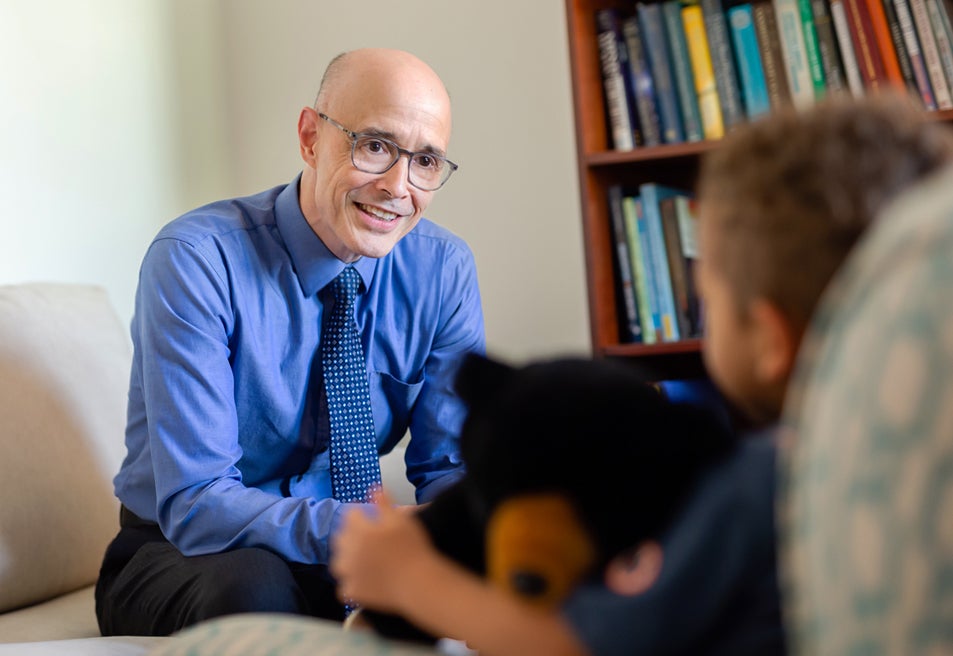Advice to Parents of Children who are Spontaneously Recalling Past Life Memories

Dr. Jim B. Tucker interviewing a young child
Dr. Jim Tucker offers guidance for parents seeking assistance with a child who appears to be remembering a previous life.
(Please note, the following is intended to be used for informational purposes only, and is not intended to serve as a substitute for professional therapeutic or counseling services)
Parents frequently ask us for advice on how to handle their children’s statements about past lives. While each case has individual differences, we offer some general guidance here that may be helpful, and we are happy to answer questions about particular situations from parents who contact us. These suggestions to parents are intended as general guidance and should not be construed as medical or psychological counseling of any kind, nor as a substitute for counseling or other treatment.
First, it is important to know that these statements do not, by themselves, indicate mental illness. We have talked with many families in which a child claimed to remember another set of parents, another home, or a previous death, and the children rarely show mental health problems. These statements are generally made by children whose development appears to otherwise be just like that of their peers. They can occur in families with a belief in reincarnation or in families where the idea of reincarnation had never been considered before the child began making the statements.
When children talk about a past life, parents are sometimes unsure how to respond. We recommend that parents be open to what their children are reporting. Some of the children show a lot of emotional intensity regarding these issues, and parents should be respectful in listening just as they are with other subjects that their children bring up.
When a child talks about a past life, we suggest that parents avoid asking a lot of pointed questions. This could be upsetting to the child and, more importantly from our standpoint, could lead the child to make up answers to the questions. It would then be difficult or impossible to separate memories from fantasy. We do think it is fine to ask general, open-ended questions such as, “Do you remember anything else?” and it is certainly fine to empathize with a child’s statements (“That must have been scary” when, for instance, a child describes a fatal accident).
We encourage parents to write down any statements about a past life that their children make. This is particularly important in cases where the children give enough information so that identifying a deceased individual that they are describing might be possible. In such a situation, having the statements recorded ahead of time would be critical in providing the best evidence that the child actually had experienced memories from a previous life.
At the same time, parents should not become so focused on the statements that they and their children lose sight of the fact that the current life is what is most important now. If children persist in saying they want their old family or old home, it might be helpful to explain that while they may have had another family in a previous life, their current family is the one they have for this life. Parents should acknowledge and value what their children have told them while making clear that the past life is truly in the past.
We do not recommend that children undergo past-life regression hypnosis. (See Concerns about Hypnotic Regression for more details.)
Parents are sometimes more upset by the statements than their child is. Hearing a child describe the experience of dying in a painful or difficult way can be hard, but both parent and child can know that the child is safe now in this life. Some parents may be comforted to know that the vast majority of these children stop talking about a previous life by the time they are 5 – 7 years old. This is the age at which children become involved with school and also the age at which they lose their memories of early childhood, and the talk about a past life fades along with those memories. Very rarely, the memories will persist into adolescence or adulthood, though with much less intensity than during the younger years. In many cases, however, as children get older they do not even remember that they ever talked about a past life.
Overall, parents often find children’s claims to remember previous lives more remarkable than do the children, for whom the apparent memories are simply part of their experience of life. Most often, the children then move on from the memories to lead typical childhoods.
Contact Us
 We would like to hear from families with reports of children who are currently spontaneously talking about memories which appear to be related to a past life. All the information shared with us is private and confidential. Please send us an email with as much detail as you care to share about what you have observed or have been hearing from a particular child.
We would like to hear from families with reports of children who are currently spontaneously talking about memories which appear to be related to a past life. All the information shared with us is private and confidential. Please send us an email with as much detail as you care to share about what you have observed or have been hearing from a particular child.
Send your emails and inquiries to our research assistant, Diane Morini at dopsplm@uvahealth.org to submit your observations and experiences of your child’s behaviors and statements about memories of a previous life.
Rest assured that only qualified study team members will have access to your report of a child’s past life memories submitted via email, and we adhere to a strict code of privacy and confidentiality in all instances. We will not disclose the names of the people involved in the account in any way, without first seeking explicit permission from the parents. You may note that there are a few published cases in which the actual names are used in presenting details of the case, and we assure you that this is rare and only done by special permission granted to us by the parents.
